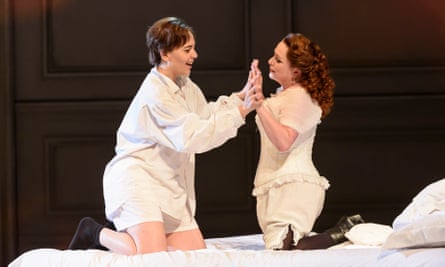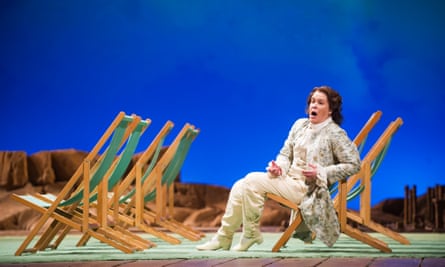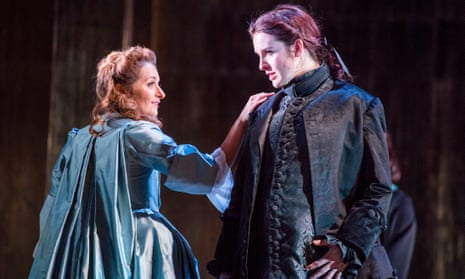A news report published in this weekend’s Observer, and picked up on by the Times the next day, suggested that professional singers whose voices mature and change can enjoy longer careers by taking what were traditionally male (tenor) roles. The pieces conflated and merged a number of issues that do not belong together: gender divisions in opera, change to voices post-pregnancy or menopause, transgender singing and women singing the tenor line in an often amateur choral setting.
“Looser gender divisions in casting” may well be possible in Shakespearean theatre, where speaking rather than singing voices are involved, but there are no female professional opera singers, even those of us who sing in the contralto range, begging to sing tenor roles such as Rodolfo (in Puccini’s La Bohème) or Alfredo (in Verdi’s La Traviata) at pitch. To suggest this is desirable, let alone possible, ignores the nature and limits of operatic voices.
I spoke to Declan Costello, a leading consultant ENT surgeon specialising in the voice about this. “The quality of a person’s voice depends on a number of different things: the vocal cords (vocal folds) are certainly critical, but just as important are the vocal resonators, which give the voice its characteristic bloom by bringing out certain overtones (or harmonics),” he said. “While it is true to say that a contralto can sing A440 (the A above middle C) at the same intensity as a tenor, the quality produced by the two of them is entirely different: a tenor is close to the top of his register, and one hears this in the effort and brightness in the sound because the shape of his male pharynx is accentuating certain of the overtones. Indeed, it is precisely this effect that makes a high tenor note so exciting to listen to. On the other hand, a contralto singing the same note with equal volume (ie the same number of decibels) will have a more mellow tone because she is using different harmonics.”

There are “trouser” roles where a female singer plays a male character, such as Octavian (in Richard Strauss’s Der Rosenkavalier), but those are roles written specifically to be sung by a woman (playing a man) at a higher pitch than a tenor would sing. In the original Rosenkavalier score, Strauss listed Octavian as a soprano role, although it is today conventionally sung by a mezzo-soprano. And the role of Cherubino (in Mozart’s Marriage of Figaro) is generally sung by a higher, lighter mezzo. There are also roles, such as the title role in Handel’s Giulio Cesare, that were written for castrati – men whose voices had been kept artificially high through castration, which lie in the range of both a mezzo-soprano and a countertenor (a man who sings in falsetto). But even in Handel’s day, if a castrato wasn’t available, he chose strong female singers: still today these roles – Xerxes and Rinaldo among them – are sung equally by female mezzos and male countertenors. For the record, however, the term “contralto profundo”, quoted in the Observer article, is not one that is used or recognised in the professional opera world – the term contralto denotes a female singer with the lowest voice.
Composers write with specific voice types (fachs) in mind. When a role is written for a tenor, it is anticipated that the “money notes” (the top notes) will carry and be heard by every single person in a large opera house, and have the potential to bring the house down. A woman singing these notes would simply not sound the same. Although opera has always pushed boundaries in terms of testing the physical limits of singers, there is simply no point, beyond pure gimmickry, in casting female voices to sing tenor roles when the voices best suited to such roles are male.
Singers Lucy Crowe and Rhian Lois were quoted in the Observer article talking about how their own voices have changed and become stronger, but neither were eyeing tenor roles. Lois has clarified that she was “talking about allowing your voice as a singer to develop naturally, which it does over the years with age, experience, stamina, life circumstances and so on, and that it is important to allow it happen”.

Costello explains: “Different women experience vastly different issues as a result of hormonal changes. Around the menopause ... changes in hormone levels can result in a reduction in vocal intensity, along with vocal fatigue. Some singers will describe a loss of brightness in their voice, and some poor vocal stability. The hormone changes can also have an effect on the mucus, causing dryness which can affect voice production. These changes are by no means predictable, with some singers carrying on long past the menopause with little change in their voices. In general, as the voice ages (usually through a person’s 60s and beyond), the muscles lose tone and strength, which can result in a quieter and slightly breathy-sounding voice. [But] none of this would add up to a female singer routinely expecting to drop to a tenor register.”
What does hold female singers back, and can ultimately lead to a career ending prematurely after vocal changes caused by hormones, is working in an industry that has historically done little to support women, or parents generally.
To that end, on International Women’s Day this Thursday, a new campaign, SWAP’ra (Supporting Women and Parents In Opera), is launching. This initiative hopes to effect positive change by redressing the gender disparity in the opera industry, acting as a guiding body and offering practical solutions to issues that women face, encouraging opera companies and individuals to work towards developing a more inclusive and cooperative industry.
We can but hope, in this era of #MeToo and #TimesUp, that change is on its way across the arts as a whole.
